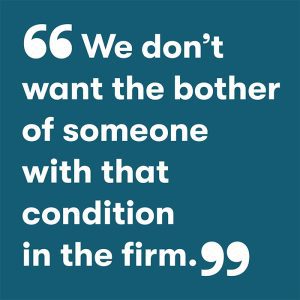 A survey from Epilepsy Action has found 42% of UK managers wouldn’t hire someone with epilepsy to save their company challenges, even though they know this is discrimination.
A survey from Epilepsy Action has found 42% of UK managers wouldn’t hire someone with epilepsy to save their company challenges, even though they know this is discrimination.
The Make Things Work campaign heard from managers and people with epilepsy who have faced workplace discrimination. The charity is calling for an urgent change in attitudes towards people with epilepsy at work.
It says a higher minimum compensation for employment discrimination is needed.
It is also asking people to sign a petition calling on the government to strengthen employment law and ensure that employers are properly punished for discriminating against disabled people.
According to the survey, 60% of people with epilepsy said they had experienced unequal treatment or discrimination at work because of their condition. More than a third (36%) had heard a colleague, or their employer, make a derogatory comment about their epilepsy, and 33% had been bullied because of it.
Epilepsy Action deputy chief executive Rebekah Smith said: “In 2023, it’s simply unacceptable for so many people with epilepsy to still face unequal treatment and discrimination at work. What’s even more concerning is seeing how widespread the misunderstanding of the condition seems to be among managers and employers, the very people who have the power to hire and dictate company culture.”
The survey included 1,420 people with epilepsy and 500 UK employers and managers.
‘Managers laughed at my seizures’
 When Sam, 35, from Sevenoaks in Kent, had a seizure at work, a group of managers who were with him stood laughing instead of helping.
When Sam, 35, from Sevenoaks in Kent, had a seizure at work, a group of managers who were with him stood laughing instead of helping.
Over the years, Sam has had other seizures at work, and on occasion has had to take time off to recover.
He said: “When I returned, I was faced with disciplinary actions for taking time off, even though they knew about my health condition. I was threatened with being sacked if it carried on. I felt as though I had to apologise. At the time, there were colleagues who bullied me.”
Over the past three years, Sam’s seizures worsened and he is currently waiting for an appointment to trial new medication.
He said: “Trying to apply for Universal Credit and Personal Independence Payments (PIP) was a nightmare. I felt as though they looked down on me, as though I was lying. Like I can work, but just don’t want to. It took a while to get support and I had to write to my local MP to get PIP, as my disability isn’t visible.”
Sam is hoping to return to work when his seizures are under control. In the meantime, he wants to share his experience to raise awareness and educate people about the condition to change attitudes.
He added: “Understanding and support is a must. I believe that every workplace should have epilepsy first aid training. We need more awareness of epilepsy in the general public.”
Forced into the office
 Holly, from Paisley, Scotland, has juvenile myoclonic epilepsy. During one of her first jobs, aged 19, her manager said to her: “Don’t have a seizure in front of me, I wouldn’t know what to do!”
Holly, from Paisley, Scotland, has juvenile myoclonic epilepsy. During one of her first jobs, aged 19, her manager said to her: “Don’t have a seizure in front of me, I wouldn’t know what to do!”
Holly added: “More recently, while working for a company remotely, I was told I still needed to go into the office ‘to impress the director’, despite it being a time when my medication and seizures weren’t stable.
“At the time, I was being weaned off my medication, and I was unable to legally drive as a result. My consultant epileptologist wrote a letter to my company requesting I be able to continue working from home, but I was still told I needed to go into the office three days a week. It was a 90-minute commute on public transport, which made me very tired. And all of my seizures are triggered by a lack of sleep.”
Holly says that more needs to be done to educate people about epilepsy in the workplace, and she wants to share her experiences to help raise awareness of the condition.
“I want employers and colleagues to know more,” she said. “Epilepsy is actually very common, and there are lots of different types of seizures. It is hard having epilepsy. It can fluctuate, it certainly has for me. There can be more or less challenging times.
“To other people with the condition trying to navigate a career, I’d say they can do whatever they want. You are where you are now despite your epilepsy and you have the ability to go as far as you want. Be open about it and what it means to you if you can, invite questions. A lot of people want to learn and are curious. Don’t be ashamed of it. And know your rights, don’t tolerate being discriminated against. Don’t let epilepsy or ignorant people stop you!”
For more information visit: Make Things Work for people with epilepsy – Epilepsy Action
More articles







